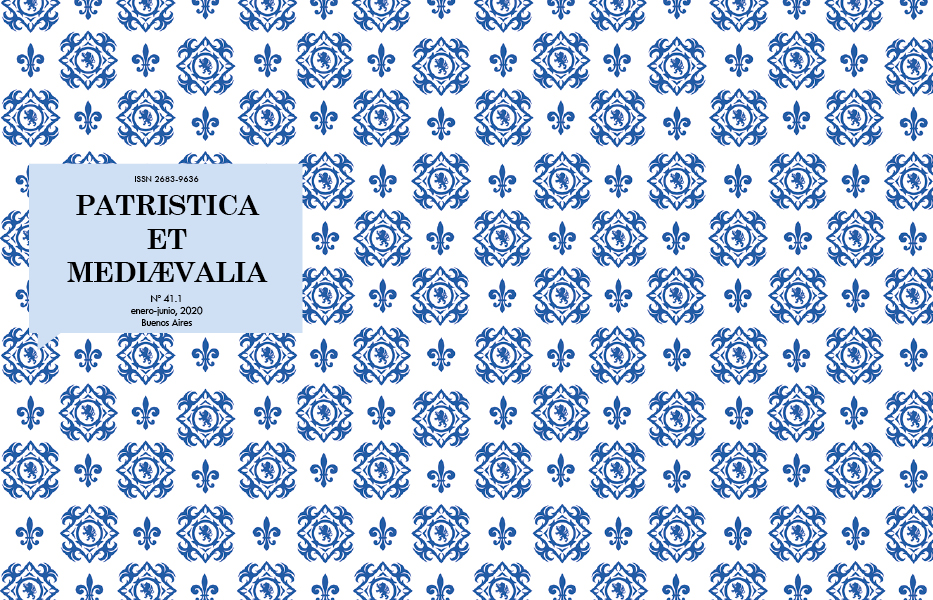The role of appetites in Thomas Aquinas's theory of sensitive knowledge
Abstract
There is a principle in the thinking of Thomas Aquinas that maintains that every cognitive act is intentional. This principle is problematic in the field of sensitive knowledge because it contrasts with the idea that the senses are totally passive and that sensitive objects are the sufficient cause of perception. The synergy of these theses generates two kinds of conflicts: 1) between the passivity of the senses and their act of addressing objects; 2) between the need for directionality to knowledge and the sufficiency of sensitive objects to cause perception. The apparent inconsistency in which the Aquinate would fall can be resolved by analyzing the role that corresponds to intellectual, sensitive and natural appetites in his theory of sensitive knowledge.Downloads
References
Thomas Aquinas (1856). Commentum in quartum librum Sententiarum magistri Petri Lombardi (Opera omnia 7/2). Ed. Typis Petri Fiaccadori: Parma.
Thomas Aquinas (1982). Quaestiones disputatae de malo (Opera omnia 23). Ed. Leonina: Roma.
Thomas Aquinas (1996). Quaestiones de Quodlibet. Quodlibet VII, VIII, IX, X, XI. Ed. Leonina: Roma.
Agustín de Hipona (1967). Tratado sobre la Santísima Trinidad. Trad. Arias, L. Madrid: BAC.
Aristóteles (1978). Acerca del alma. Trad. Calvo, T. Madrid: Gredos.
Tomás de Aquino (1947). Suma Teológica I. Madrid: BAC.
Tomás de Aquino (1952). Suma Contra los Gentiles. Madrid: Editorial Católica.
Tomás de Aquino (1954-1959). Suma Teológica III-VI. Madrid: BAC.
Tomás de Aquino (1999). De veritate. Cuestión 13: Tratado sobre el arrebato místico. Trad. Tellez, E. Pamplona: Servicio de Publicaciones de la Universidad de Navarra.
Tomás de Aquino (2001). De veritate. Cuestión 10: La mente. Trad. González, A. Pamplona: Servicio de Publicaciones de la Universidad de Navarra.
Tomás de Aquino (2001). De veritate. Cuestión 12: Sobre la profecía. Trad. Tellez, E. Pamplona: Servicio de Publicaciones de la Universidad de Navarra.
Tomás de Aquino (2001). De veritate. Cuestión 22: El apetito del bien. Trad. Sellés, J. Pamplona: Servicio de Publicaciones de la Universidad de Navarra.
Tomás de Aquino (2001). El Maestro: Cuestiones disputadas sobre la Verdad, c. 11. Suma Teológica 1, c. 117. Trad. Muñoz, P. Lima: Fondo Editorial UCSS.
Tomás de Aquino (2003). De veritate. Cuestión 8: El conocimiento de los Ángeles. Trad. González, A. y Sellés, J. Pamplona: Servicio de Publicaciones de la Universidad de Navarra
Beuchot, M. (2008). Conocimiento, realidad y acción en santo Tomas de Aquino. Salamanca: Editorial San Esteban.
Brower, J. y Brower-Toland, S. (2008). “Aquinas on Mental Representation: Concepts and Intentionality”, The Philosophical Review 117, 193-243.
Carcedo, L. (1992). Tomás de Aquino. Salamanca: Ediciones Universidad de Salamanca.
Caston, V. (2005). “The Spirit and the Letter: Aristotle on Perception”. En: Salles, R. (ed.). Metaphysics, Soul and Ethics in Ancient Thought. Themes From the Work of Richard Sorabji. Oxford: Oxford University Press, 245-320.
Davies, B. (1992). The Thought of Thomas Aquinas. Oxford: Clarendon Press.
Dewan, L. (1980). “St. Albert, the Sensible, and Spiritual Being”. En: Weisheipl, J. A. (ed.). Albertus Magnus and the Sciences. Commemorative Essays. Toronto: PIMS, 291-320.
Geach, P. (1954). “Form and Existence”, Proceedings of the Aristotelian Society 55, 251-272.
González Vidal, N. (2008). La pasión de la tristeza y su relación con la moralidad en santo Tomás de Aquino. Pamplona: Servicio de Publicaciones de la Universidad de Navarra. (Cuadernos de Anuario Filosófico 205).
Haldane, J. (1989). “Brentano’s Problem”, Grazer Philosophische Studien 35, 1-32.
Haldane, J. (1993). “Mind-World Identity Theory and the Anti-Realist Challenge”. En: Idem y Wright, C. (eds.). Reality, Representation and Projection, 15-37.
Klima, G. (2013). “Three Myths of Intentionality Versus Some Medieval Philosophers”, International Journal of Philosophical Studies 21.3, 359-376. DOI: 10.1080/09672559.2013.788266.
Lane, M. (2013). The Role of intentio in Augustine’s Understanding of the Soul’s Ascent to God: From De animae quantitate to De trinitate. Durham: Durham University. (Durham theses. Disponible en: http://etheses.dur.ac.uk/10571/).
Moser, R. (2009). St. Thomas Aquinas and John Haldane on Knowledge of Material Things (tesis doctoral). Ottawa: Universidad de Ottawa.
Moya Cañas, P. (1999). “Dificultades que surgen en la comprensión del cono- cimiento sensible”, Tópicos. Revista de Filosofía 16.1, 87-123.
Panaccio, C. (1997). “Angel’s Talk, Mental Language, and the Transparency of the Mind”. En: Marmo, C. (ed.). Vestigia, Imagines, Verba. Semiotics and Logic in Medieval Theological Texts (XIIth-XIVth Century). Turnhout: Brepols, 323-335.
Pasnau, R. (1997). Theories of Cognition in the Later Middle Ages. Cambridge: Cambridge University Press.
Perler, D. (2004). Theorien der Intentionalität im Mittelalter. Frankfurt: Klostermann.
Sanguinetti, J. J. (2011). “La especie cognitiva en Tomás de Aquino”, Tópicos. Revista de Filosofía 40, 63-103.
Scarpelli Cory, T. (2015). “Attention, Intentionality, and Mind-Reading in Aquinas’s De Malo 16.8”. En: Dougherty, M. V. (ed.). Aquinas’s Disputed Questions on Evil. Cambridge: Cambridge University Press, 164-191.
Sorabji, R. (1991). “From Aristotle to Brentano. The Development of the Concept of Intentionality”. En: Blumenthal, H. y Robinson, H. (eds.). Festschrift fur A. C. Loyd: on the Aristotelian Tradition. Oxford: Oxford University Press, 227-259.
1. The authors who publish in this magazine accept the following conditions:
-
They retain the copyright and grant to the magazine the right of the first publication, with the work registered under the Attribution-ShareAlike 4.0 International License that allows third parties to use what is published as long as they mention the authorship of the work and the first publication in this magazine.
-
They can make other independent and additional contractual agreements for the non-exclusive distribution of the version of the article published in this magazine (eg. include it in an institutional repository or publish it in a book) provided that they clearly indicate that the work was first published in this journal.
-
They are allowed and recommended to publish their work on the Internet (for example on institutional or personal pages).
2. AutoArchive Conditions. Authors are allowed and encouraged to distribute post-print electronic versions of their manuscripts because it promotes their circulation, a possible increase of quotation and a major reach among the Academic community. Color RoMEO: blue.













